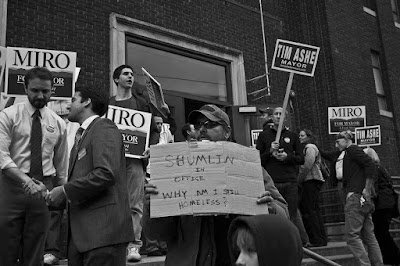
Vermont residents protest outside of Senator Patrick Leahy's Burlington office
BURLINGTON: On the heels of Senator Patrick Leahy's vote in support of the National Defense Authorization Act residents of Burlington as well as Ferrisburg, Bristol, and other surrounding towns arrived outside Leahy's Main St. office building to protest his vote that supported, among other things, the codifying into law, the indefinite detention, without charge or trial, of American citizens.
Feeding off the national debate that the NDAA has stirred up, Vermonters demanded a meeting with Leahy's staff in order to air their grievances. Meeting yesterday at 4pm with Leahy's Chief of Staff John Tracey, the Vermonters expressed grave disappointment with their Senator. "Apparently the tradeoff of getting National Guard Representation on the Joint Chiefs of Staff was worth it to nullify our Constitution. Even with the signing statement, who's to say what interpretation the next President will have when they come into office?" said Jonathan Leavitt, a Burlington resident who attended the meeting.
Meanwhile, the protest continued down on Main St. as various members of the press arrived to conduct interviews and photograph various protesters, some of whom concealed their faces, citing distortion of their words by the local corporate media in the past.
For more photographs by Dylan Kelley please visit his photo-blog here.





